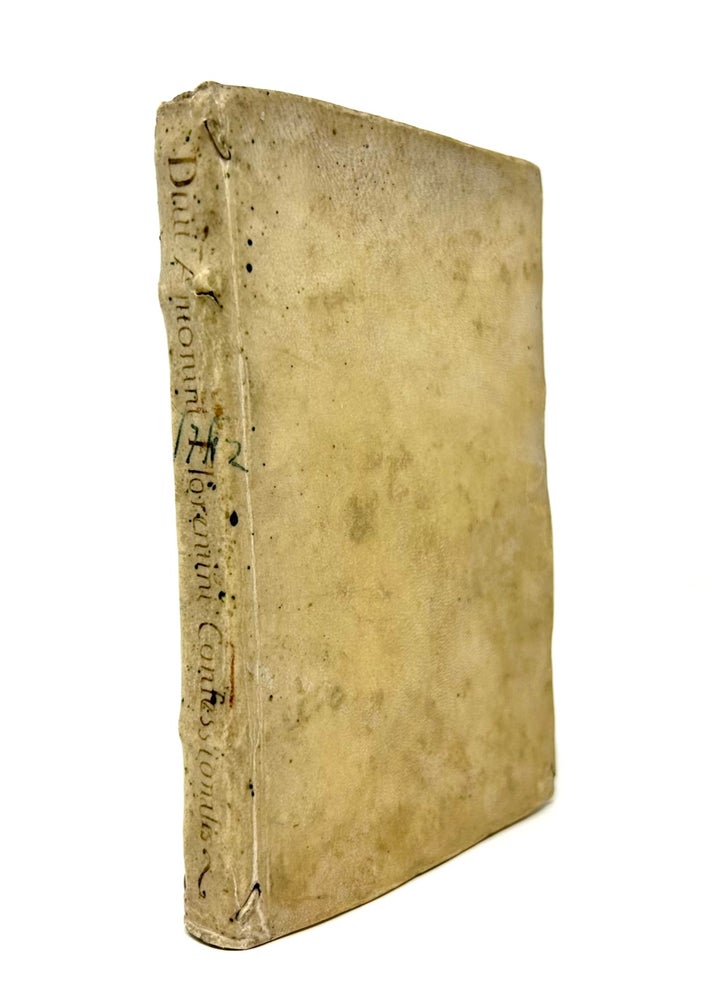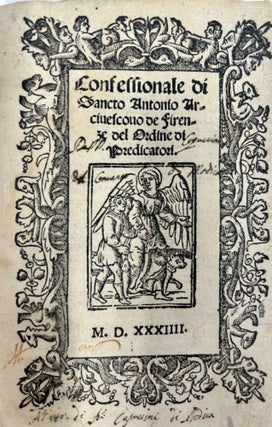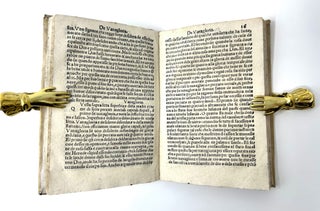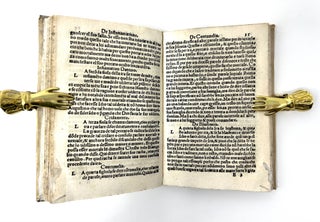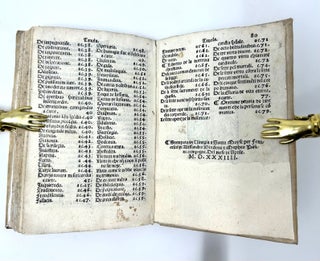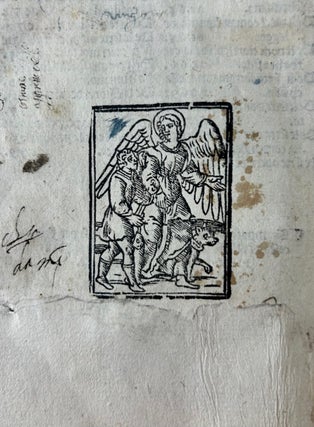Confessionale di Sancto Antonio Arcivescovo de Firenze
Venezia: Santo Moyle for Francesco di Alessandro Bindoni and Mapheo Pasini, 1534. First. Parchment. Rare Venetian edition of the confessional work of Saint Antonino.
Confessionale di Sancto Antonio Arcivescovo de Firenze del Ordine di Predicatori
– Venezia – 1534
Colophon: Printed in Venice in Santo Moyle for Francesco di Alessandro Bindoni and Mapheo Pasini companions. In April. MDXXXIIII). 1534
Saint Antoninus
[Editor] Bindoni, Francesco & Pasini, Maffeo
Hard parchment with handwritten title on the spine, all edges sprayed.
Title page with beautiful woodcut representing Raphael the Archangel with Tobias and a dog, full page, in an allegorical frame and in Gothic characters, typographical brand also repeated on the back of the last sheet, text in Roman type, initials in woodcut, most with the black space left to illuminate. Restoration without loss of text on the last sheet verso. Rare Venetian edition of the confessional work of Saint Antonino.
80 pp
15 x 10 cm
Important treatise on Confession, aimed above all at the "states" of life: marriage, celibacy, widowhood.
Antoninus composed as many as four works, namely the Summa confessionis which underlines the power of the confessor and the possibility of issuing an excommunication, the way of questioning about the commandments and the seven deadly sins, the restitution, also known as Defecerunt (from first word of the prologue).
Practical utility, and above all common sense, is perhaps the reason for so much success and the many editions it had very soon.
Much has been written over the years about the figure and works of St. Antoninus Archbishop of Florence from 1446 to 1459.
The most recent historiography focused on the category of "discipline" has recovered the salient aspect of the work of the holy archbishop linked to the dissemination of his confessionals and the Summa theologica or Summa moralis, inserting it in the more general reflection on the evolution and on the weight that devout literature and manuals for confessors had in the modern age. The common datum that emerges from these researches is that of the turning point that the work of St. Antoninus represented on the level of moral theology with his minute casuistry aimed above all at the "states" of life, marriage, celibacy, widowhood.
Antonino Pierozzi also known as Sant'Antonino da Firenze (Florence, 1389 - Montughi, 1459) was an Italian theologian, archbishop and man of letters; he belonged to the order of preaching friars, was archbishop of Florence and a scholar in the late scholastic ranks. He is revered as a saint by the Catholic Church.
A disciple of St. Thomas, Antoninus was fascinated by Aquinas' theological precision. But in his writings he did not intend to do speculative work, rather practical. For him, ease of learning and use by priests was more important than terminological precision.
He was particularly careful in this work to distinguish the civil and ecclesiastical fields in which the clergy must move, as well as the laity, so much so that someone took the work as Juris pontificii et caesarei summa. This was followed by numerous summaries in the vernacular, especially for the use of confessors and penitents. Good. Item #36
Price: $950.00

